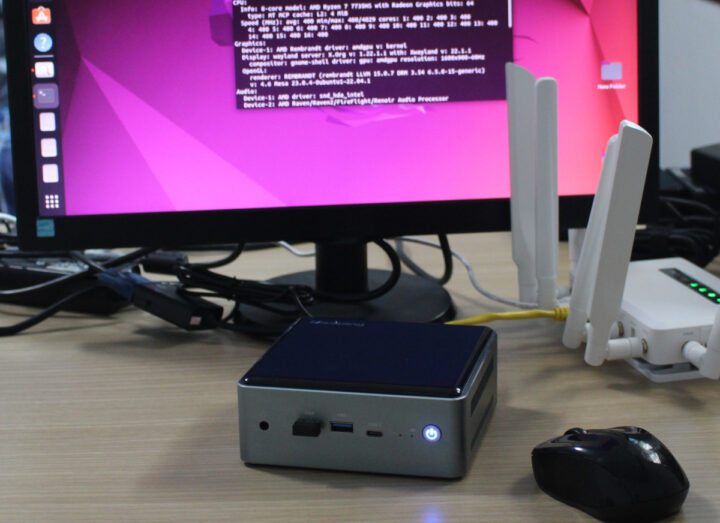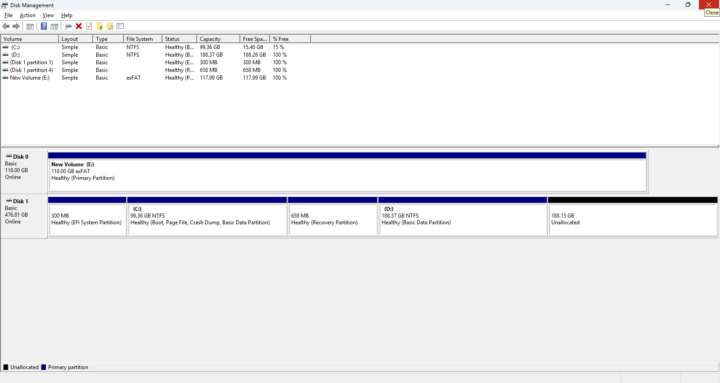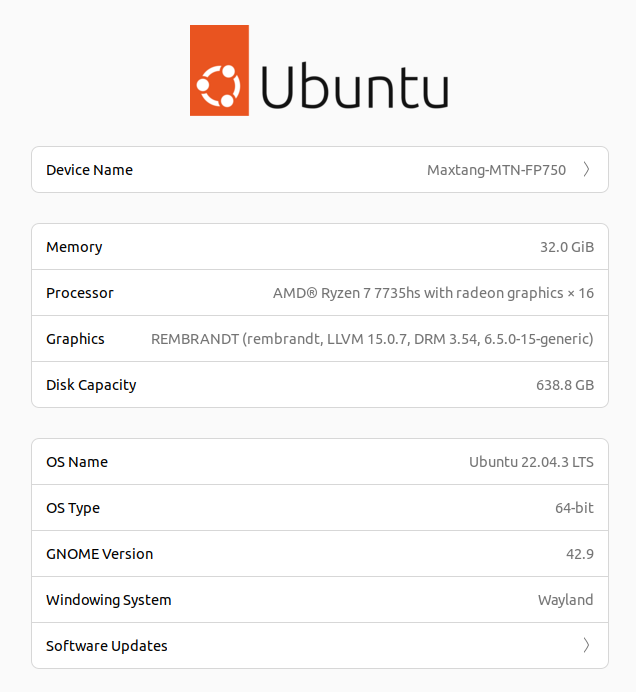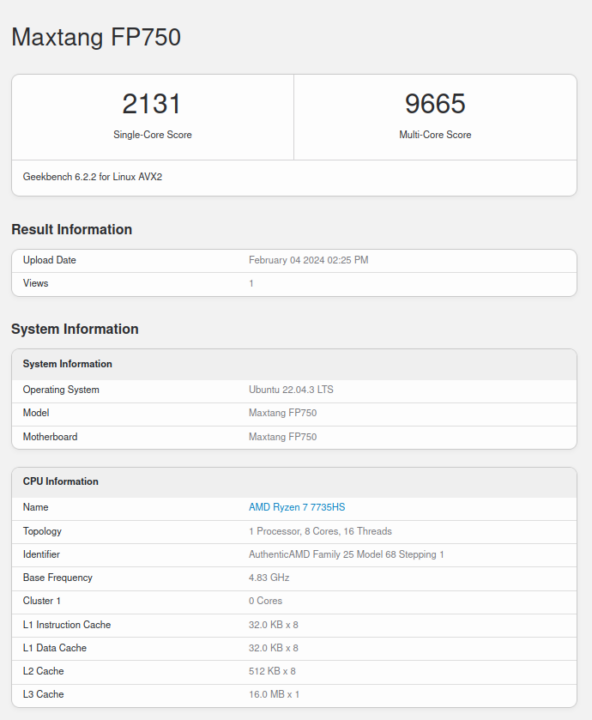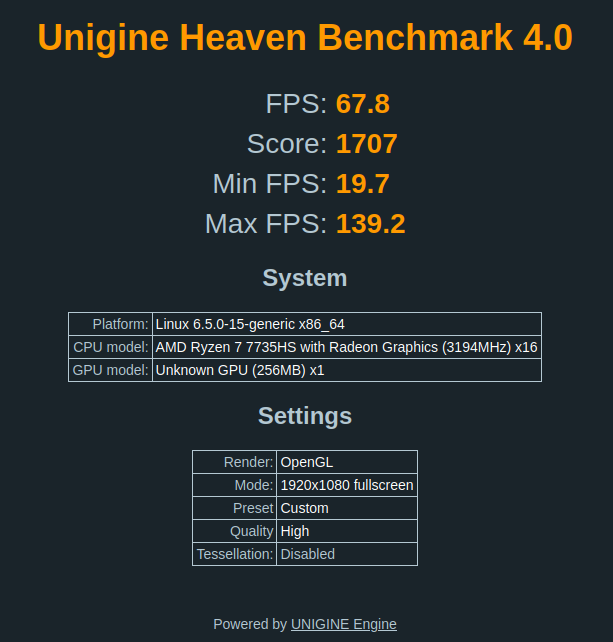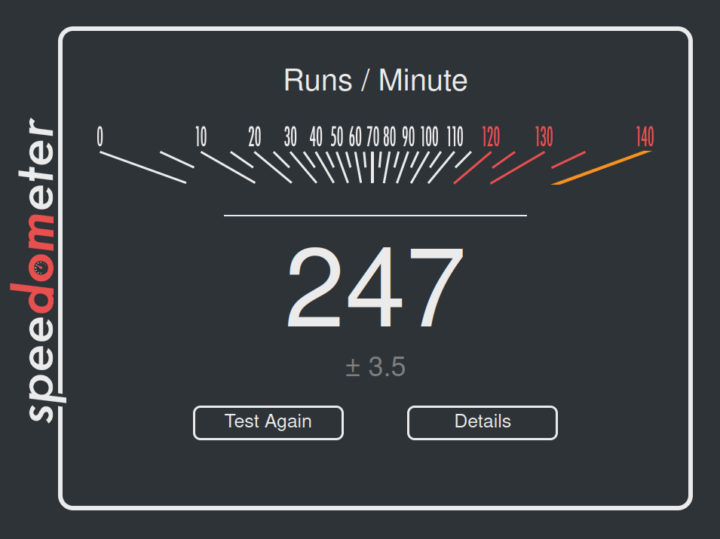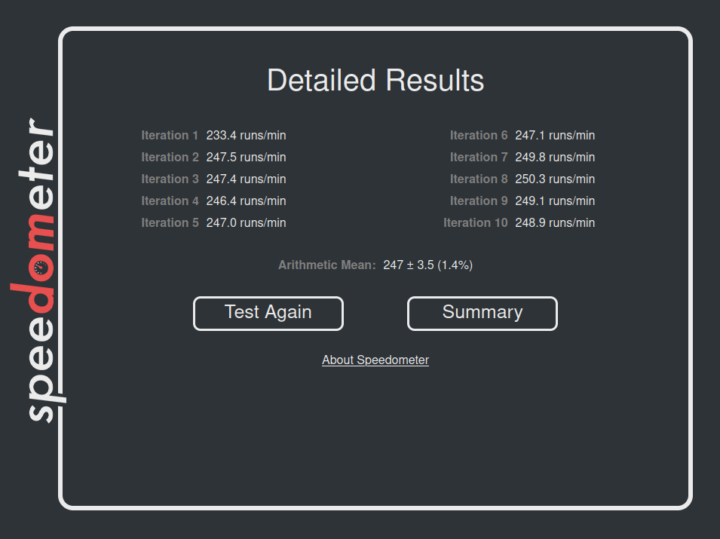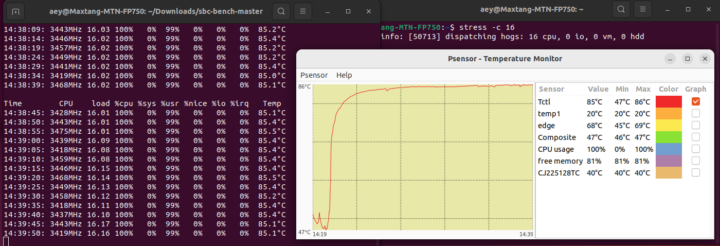We’ve already checked out the hardware of the Maxtang MTN-FP750 mini PC in the first part of the review with an unboxing and a teardown, and tested the AMD Ryzen 7 7735HS Mini PC with 32GB DDR5 and a 512GB SSD in Windows 11 Pro in the second part. In the third part of the review, we will report our experience with the Ubuntu 22.04 Linux operating system. This includes features testing, several benchmarks, storage and networking performance testing, a stress test to check thermal performance, as well as fan noise and power consumption measurements.
Ubuntu 22.04 installation
Since the plan is to install Ubuntu 22.04 alongside Windows 11, so we will shrink the Windows 11 partition by about half first, before inserting the Ubuntu 22.04.3 USB drive to install the Linux distribution.
The installation went smoothly with no issues to report on.
Ubuntu 22.04 System information
Going to Settings->About confirms we have Ubuntu 22.04.3 64-bit running on the Maxtang MTN-FP750 mini PC with 32GB RAM and an AMD Ryzen 7 7735HS CPU with AMD Radeon Graphics, and a total of 638.8GB storage (512GB M.2 SSD included in the system, plus our own 2.5-inch 128GB SATA SSD)
We can get a few more details from the command line:
|
1 2 3 4 5 6 7 8 9 10 11 12 13 14 15 16 17 18 19 20 |
aey@Maxtang-MTN-FP750:~$ cat /etc/lsb-release DISTRIB_ID=Ubuntu DISTRIB_RELEASE=22.04 DISTRIB_CODENAME=jammy DISTRIB_DESCRIPTION="Ubuntu 22.04.3 LTS" aey@Maxtang-MTN-FP750:~$ uname -a Linux Maxtang-MTN-FP750 6.5.0-15-generic #15~22.04.1-Ubuntu SMP PREEMPT_DYNAMIC Fri Jan 12 18:54:30 UTC 2 x86_64 x86_64 x86_64 GNU/Linux aey@Maxtang-MTN-FP750:~$ free -mh total used free shared buff/cache available Mem: 28Gi 3.4Gi 22Gi 78Mi 2.5Gi 24Gi Swap: 2.0Gi 0B 2.0Gi aey@Maxtang-MTN-FP750:~$ df -mh Filesystem Size Used Avail Use% Mounted on tmpfs 2.9G 2.3M 2.9G 1% /run /dev/nvme0n1p6 185G 15G 161G 9% / tmpfs 15G 0 15G 0% /dev/shm tmpfs 5.0M 4.0K 5.0M 1% /run/lock efivarfs 128K 24K 100K 20% /sys/firmware/efi/efivars /dev/nvme0n1p1 300M 36M 264M 13% /boot/efi tmpfs 2.9G 204K 2.9G 1% /run/user/1000 |
Inxi utility provides a few more details about the system as well:
|
1 2 3 4 5 6 7 8 9 10 11 12 13 14 15 16 17 18 19 20 21 22 23 24 25 26 27 28 29 30 31 32 33 34 35 36 37 38 39 40 41 42 43 44 45 46 47 48 49 50 |
aey@Maxtang-MTN-FP750:~$ inxi -Fc0 System: Host: Maxtang-MTN-FP750 Kernel: 6.5.0-15-generic x86_64 bits: 64 Desktop: GNOME 42.9 Distro: Ubuntu 22.04.3 LTS (Jammy Jellyfish) Machine: Type: Mini-pc Mobo: Maxtang model: FP750 v: V1.0 serial: <superuser required> UEFI: American Megatrends LLC. v: FP750H102 date: 04/17/2023 CPU: Info: 8-core model: AMD Ryzen 7 7735HS with Radeon Graphics bits: 64 type: MT MCP cache: L2: 4 MiB Speed (MHz): avg: 400 min/max: 400/4829 cores: 1: 400 2: 400 3: 400 4: 400 5: 400 6: 400 7: 400 8: 400 9: 400 10: 400 11: 400 12: 400 13: 400 14: 400 15: 400 16: 400 Graphics: Device-1: AMD Rembrandt driver: amdgpu v: kernel Display: wayland server: X.Org v: 1.22.1.1 with: Xwayland v: 22.1.1 compositor: gnome-shell driver: gpu: amdgpu resolution: 1600x900~60Hz OpenGL: renderer: REMBRANDT (rembrandt LLVM 15.0.7 DRM 3.54 6.5.0-15-generic) v: 4.6 Mesa 23.0.4-0ubuntu1~22.04.1 Audio: Device-1: AMD driver: snd_hda_intel Device-2: AMD Raven/Raven2/FireFlight/Renoir Audio Processor driver: snd_pci_acp6x Device-3: AMD Family 17h HD Audio driver: snd_hda_intel Sound Server-1: ALSA v: k6.5.0-15-generic running: yes Sound Server-2: PulseAudio v: 15.99.1 running: yes Sound Server-3: PipeWire v: 0.3.48 running: yes Network: Device-1: Realtek RTL8125 2.5GbE driver: r8169 IF: enp2s0 state: up speed: 1000 Mbps duplex: full mac: b0:41:6f:0b:65:85 Drives: Local Storage: total: 594.94 GiB used: 14.09 GiB (2.4%) ID-1: /dev/nvme0n1 vendor: ForeseSU04Ge model: VP1000F512G size: 476.94 GiB ID-2: /dev/sda model: CJ225128TC size: 118 GiB Partition: ID-1: / size: 184.13 GiB used: 14.05 GiB (7.6%) fs: ext4 dev: /dev/nvme0n1p6 ID-2: /boot/efi size: 299.4 MiB used: 36 MiB (12.0%) fs: vfat dev: /dev/nvme0n1p1 Swap: ID-1: swap-1 type: file size: 2 GiB used: 0 KiB (0.0%) file: /swapfile Sensors: System Temperatures: cpu: 20.0 C mobo: N/A gpu: amdgpu temp: 47.0 C Fan Speeds (RPM): N/A Info: Processes: 378 Uptime: 10h 16m Memory: 28.18 GiB used: 3.95 GiB (14.0%) Shell: Bash inxi: 3.3.13 |
It shows an AMD Ryzen 7 7735HS processor with 16 threads clocked up to 4829 MHz, a Foresee SU04Ge M.2 NVMe SSD, and a 118GB CJ225128TC SATA SSD, as well as an RTL8125 2.5GbE controller. The CPU temperature is clearly wrong, but the GPU temperature is shown to be 47°C.
Ubuntu 22.04 benchmarks with Maxtang MTN-FP750 mini PC
We’ll start the Ubuntu 22.04 benchmarks for the MTN-FP750 mini PC with Thomas Kaiser’s sbc-bench.sh script:
|
1 2 3 4 5 6 7 8 9 10 11 12 13 14 15 16 17 18 19 20 21 22 23 24 25 26 27 28 29 30 31 32 33 34 35 36 37 38 39 40 41 42 43 44 45 46 47 48 49 50 51 52 53 54 55 56 57 58 59 60 61 62 63 64 65 66 67 68 69 70 71 72 73 74 75 76 77 78 79 80 81 82 83 84 85 86 87 88 89 90 91 92 93 94 95 96 97 98 99 100 101 102 103 104 105 106 107 108 109 110 111 112 113 114 115 116 117 118 119 120 121 122 123 124 125 126 127 128 129 |
aey@Maxtang-MTN-FP750:~/Downloads/sbc-bench-master$ sudo ./sbc-bench.sh -r Starting to examine hardware/software for review purposes... sbc-bench v0.9.62 Installing needed tools: apt -f -qq -y install gcc make build-essential lm-sensors curl git sysstat powercap-utils binutils mmc-utils smartmontools stress-ng p7zip, tinymembench, ramlat, mhz, cpufetch, cpuminer. Done. Checking cpufreq OPP. Done. Executing tinymembench. Done. Executing RAM latency tester. Done. Executing OpenSSL benchmark. Done. Executing 7-zip benchmark. Done. Throttling test: heating up the device, 5 more minutes to wait. Done. Checking cpufreq OPP again. Done (10 minutes elapsed). Results validation: * Measured clockspeed not lower than advertised max CPU clockspeed * No swapping * Background activity (%system) OK * Too much other background activity: 1% avg, 3% max -> https://tinyurl.com/mr2wy5uv Full results uploaded to http://sprunge.us/Jw9SYh # Maxtang FP750 / Ryzen 7 7735HS Tested with sbc-bench v0.9.62 on Sun, 04 Feb 2024 11:26:47 +0700. Full info: [http://sprunge.us/Jw9SYh](http://sprunge.us/Jw9SYh) ### General information: Information courtesy of cpufetch: Name: AMD Ryzen 7 7735HS with Radeon Graphics Microarchitecture: Zen 3+ Technology: 6nm Max Frequency: 4.829 GHz Cores: 8 cores (16 threads) AVX: AVX,AVX2 FMA: FMA3 L1i Size: 32KB (256KB Total) L1d Size: 32KB (256KB Total) L2 Size: 512KB (4MB Total) L3 Size: 16MB Peak Performance: 1.24 TFLOP/s Ryzen 7 7735HS, Kernel: x86_64, Userland: amd64 CPU sysfs topology (clusters, cpufreq members, clockspeeds) cpufreq min max CPU cluster policy speed speed core type 0 0 0 400 4829 - 1 0 1 400 4829 - 2 0 2 400 4829 - 3 0 3 400 4829 - 4 0 4 400 4829 - 5 0 5 400 4829 - 6 0 6 400 4829 - 7 0 7 400 4829 - 8 0 8 400 4829 - 9 0 9 400 4829 - 10 0 10 400 4829 - 11 0 11 400 4829 - 12 0 12 400 4829 - 13 0 13 400 4829 - 14 0 14 400 4829 - 15 0 15 400 4829 - 28861 KB available RAM ### Policies (performance vs. idle consumption): Status of performance related policies found below /sys: /sys/module/pcie_aspm/parameters/policy: default [performance] powersave powersupersave ### Clockspeeds (idle vs. heated up): Before at 53.5°C: cpu0: OPP: 4829, Measured: 4786 After at 75.2°C: cpu0: OPP: 4829, Measured: 4758 (-1.5%) ### Performance baseline * memcpy: 19252.7 MB/s, memchr: 38790.2 MB/s, memset: 18055.7 MB/s * 16M latency: 72.34 36.95 49.16 30.22 41.38 45.22 44.09 47.05 * 128M latency: 95.60 92.99 94.46 90.60 93.07 88.32 93.96 95.68 * 7-zip MIPS (3 consecutive runs): 54174, 54746, 55305 (54740 avg), single-threaded: 5455 * `aes-256-cbc 1104235.98k 1248652.89k 1284953.86k 1294866.43k 1297418.92k 1297498.11k` * `aes-256-cbc 1106201.17k 1248725.97k 1285438.89k 1294905.00k 1297328.81k 1297694.72k` ### PCIe and storage devices: * Realtek RTL8125 2.5GbE: Speed 5GT/s (ok), Width x1 (ok), driver in use: r8169 * AMD Rembrandt USB4 XHCI controller #3: Speed 16GT/s (ok), Width x16 (ok), driver in use: xhci_hcd * AMD Rembrandt USB4 XHCI controller #4: Speed 16GT/s (ok), Width x16 (ok), driver in use: xhci_hcd * AMD ACP/ACP3X/ACP6x Audio Coprocessor: Speed 16GT/s (ok), Width x16 (ok), driver in use: snd_pci_acp6x * AMD FCH SATA [AHCI mode]: Speed 16GT/s (ok), Width x16 (ok), driver in use: ahci * AMD Rembrandt USB4 XHCI controller #8: Speed 16GT/s (ok), Width x16 (ok), driver in use: xhci_hcd * AMD Rembrandt USB4 XHCI controller #5: Speed 16GT/s (ok), Width x16 (ok), driver in use: xhci_hcd * AMD Rembrandt USB4 XHCI controller #6: Speed 16GT/s (ok), Width x16 (ok), driver in use: xhci_hcd * 476.9GB "FORESEE VP1000F512G" SSD as /dev/nvme0: Speed 8GT/s (ok), Width x4 (ok), 0% worn out, drive temp: 44°C * 118GB "CJ225128TC" SSD as /dev/sda: SATA 2.6, 3.0 Gb/s (current: 3.0 Gb/s), drive temp: 40°C ### Challenging filesystems: The following partitions are NTFS: nvme0n1p3,nvme0n1p4,nvme0n1p5 -> https://tinyurl.com/mv7wvzct ### Swap configuration: * /swapfile on /dev/nvme0n1p6: 2.0G (0K used) ### Software versions: * Ubuntu 22.04.3 LTS * Compiler: /usr/bin/gcc (Ubuntu 11.4.0-1ubuntu1~22.04) 11.4.0 / x86_64-linux-gnu * OpenSSL 3.0.2, built on 15 Mar 2022 (Library: OpenSSL 3.0.2 15 Mar 2022) ### Kernel info: * `/proc/cmdline: BOOT_IMAGE=/boot/vmlinuz-6.5.0-15-generic root=UUID=c85b3345-8c63-4d9d-9855-e0d5bbfbba31 ro quiet splash vt.handoff=7` * Vulnerability Spec rstack overflow: Mitigation; safe RET, no microcode * Vulnerability Spec store bypass: Mitigation; Speculative Store Bypass disabled via prctl * Vulnerability Spectre v1: Mitigation; usercopy/swapgs barriers and __user pointer sanitization * Kernel 6.5.0-15-generic / CONFIG_HZ=250 Waiting for the device to cool down...................................... 42.0°C |
The maximum CPU temperature was 82.5°C, and no CPU throttling occurred. The 7-zip benchmarks score actually increased between runs starting at 54,174 MIPS, then 54,746 points, andfinally 55,305 with an average of 54,740 points.
Let’s check out the power limits with Ryzenadj:
|
1 2 3 4 5 6 7 8 9 10 11 12 13 14 15 16 17 18 19 20 21 22 23 24 25 26 27 28 29 30 31 32 33 |
aey@Maxtang-MTN-FP750:~/RyzenAdj/build$ sudo ./ryzenadj -i CPU Family: Rembrandt SMU BIOS Interface Version: 18 Version: v0.14.0 PM Table Version: 450004 | Name | Value | Parameter | |---------------------|-----------|--------------------| | STAPM LIMIT | 35.000 | stapm-limit | | STAPM VALUE | 8.156 | | | PPT LIMIT FAST | 35.001 | fast-limit | | PPT VALUE FAST | 9.533 | | | PPT LIMIT SLOW | 35.001 | slow-limit | | PPT VALUE SLOW | 6.875 | | | StapmTimeConst | nan | stapm-time | | SlowPPTTimeConst | nan | slow-time | | PPT LIMIT APU | 35.001 | apu-slow-limit | | PPT VALUE APU | 0.000 | | | TDC LIMIT VDD | 55.000 | vrm-current | | TDC VALUE VDD | 1.271 | | | TDC LIMIT SOC | 15.000 | vrmsoc-current | | TDC VALUE SOC | 2.134 | | | EDC LIMIT VDD | 130.000 | vrmmax-current | | EDC VALUE VDD | 66.090 | | | EDC LIMIT SOC | 20.000 | vrmsocmax-current | | EDC VALUE SOC | 0.097 | | | THM LIMIT CORE | 90.001 | tctl-temp | | THM VALUE CORE | 48.014 | | | STT LIMIT APU | 0.000 | apu-skin-temp | | STT VALUE APU | 0.000 | | | STT LIMIT dGPU | 0.000 | dgpu-skin-temp | | STT VALUE dGPU | 0.000 | | | CCLK Boost SETPOINT | nan | power-saving / | | CCLK BUSY VALUE | nan | max-performance | |
All main power limits are the same:
- Sustained Power Limit (STAPM LIMIT) – 35 Watts
- Actual Power Limit (PPT LIMIT FAST) – 35 watts
- Average Power Limit (PPT LIMIT SLOW) – 35 watts
Now let’s run CPU single and multi-core benchmarks with Geekbench 6.2.2.
The single-core score is 2131 points, and the multi-core one is 9,665 points. You’ll find the full details on Geekbench website.
Next up is GPU performance with Unigine Heaven Benchmark 4.0 where the Maxtang MTN-FP750 mini PC achieves 67.8 fps on average and a score of 1,707 points at 1920×1080 resolution.
We’ll now test YouTube videos streaming at both 4K and 8K resolution in Firefox.
We played a 4Kp30 video for about 5 minutes and it was smooth with no frames dropped at all.
Switching to 4Kp60 was fine too with only 41 frames dropped out of 37,737 when playing the video for a little over 10 minutes.
An 8K YouTube video at 30 FPS played great with no frame dropped at all.
8Kp60 was great too with 18 frames dropped out of 36,972 while playing the video for a little over 10 minutes.
4K video playback performance on Ubuntu 22.04 (Firefox) and Windows 11 (Chrome) is similar, but 8K 60 FPS was somehow much better on Ubuntu 22.04 since most frames were dropped at 8Kp60 on Windows 11.
Speedometer 2.0 was used in Firefox to evaluate web browsing performance.
The score was 247 runs per minute with some variations between iterations with the score ranging from 233.4 to 250.3.
Comparing Maxtang MTN-FP750 performance in Ubuntu 22.04 with other mini PCs
Let’s now compare the Maxtang MTN-FP750 against some of its peers to get a better understanding of the performance in Ubuntu 22.04. We’ll use GEEKOM A5 (AMD Ryzen 7 5800H), GEEKOM Mini IT11 (11th Gen Core i7-11390H), GEEKOM AS 6 (AMD Ryzen 9 6900HX), and GEEKOM Mini IT13 as reference points.
Before checking out the benchmark results, we’ll have a look at the key features and specifications of each system.
| Maxtang MTN-FP750 | GEEKOM A5 | GEEKOM Mini IT11 | GEEKOM AS 6 | GEEKOM Mini IT13 | |
|---|---|---|---|---|---|
| SoC | AMD Ryzen 7 7735HS | AMD Ryzen 7 5800H | Intel Core i7-11390H | AMD Ryzen 9 6900HX | Intel Core i9-13900H |
| CPU | 8-core/16-thread up to 4.75 GHz | 8-core/16-thread processor up to 4.4 GHz | 4-core/8-thread up to 5.0 GHz | 8-core/16-thread up to 4.9 GHz | 14-core/20-thread up to 5.4 GHz |
| GPU | AMD Radeon 680M Graphics | AMD Radeon Vega 8 Graphics | 96 EU Intel Iris Xe Graphics up to 1.4 GHz | AMD Radeon Graphics 680M | 96 EU Intel Iris Xe Graphics up to 1.5 GHz |
| Memory | 32GB DDR5-4800 | 32GB DDR4-3200 | 32GB DDR4 | 32GB DDR5-4800 | 32GB DDR4-3200 |
| Storage | 512GB NVMe SSD | 512GB NVMe SSD | 1TB NVMe SSD | 1TB NVMe SSD | 2TB NVMe SSD |
| Default OS | Windows 11 Pro | Windows 11 Pro | Windows 11 Pro | Windows 11 Pro | Windows 11 Pro |
Here are the benchmark results for each mini PC in Ubuntu 22.04.
| Maxtang MTN-FP750 | GEEKOM A5 | GEEKOM Mini IT11 | GEEKOM AS 6 | GEEKOM Mini IT13 | |
|---|---|---|---|---|---|
| sbc-bench.sh | |||||
| - memcpy | 19,252.7 MB/s | 18,717.0 MB/s | 19,734 MB/s | 19,131.7 MB/s | 24,014.4 (P-core) |
| - memset | 18,055.7 MB/s | 43,837.0 MB/s | 45,636.7 MB/s | 16,781.4 MB/s | 26,647.9 (P-Core) |
| - 7-zip (average) | 54,740 | 53,610 | 25,167 | 54,592 | 56,540 |
| - 7-zip (top result) | 55,305 | 54,850 | 25,401 | 56,251 | 60,981 |
| - OpenSSL AES-256 16K | 1,297,694.72k | 1,202,869.59k | 1,707,917.31k | 1,249,203.54k | 1,844,401.49k (P-Core) |
| Geekbench 6 Single | 2,131 | 2,002 | 1,977 | 1,992 | 2,745 |
| Geekbench 6 Multi | 9,665 | 9,347 | 5,729 | 9,535 | 11,974 |
| Unigine Heaven score | 1707 | 890 | 1,079 | 1,553 | 1,333 |
| Speedometer (Firefox) | 247 | 218 | - | 202 | 273 |
Overall performance is pretty good, and quite similar to the GEEKOM AS 6, although the Maxtang MTN-FP750 has the best 3D graphics score (in Unigine Benchmark 4.0) of the mini PCs above. It’s not too far from the Intel Core i9-powered Mini IT13 either, and offers a better performance/price ratio albeit some of that is due to the lower capacity 512GB SSD.
Storage testing and USB ports
We tested the performance of the preinstalled 512GB NVMe SSD with iozone3:
|
1 2 3 4 5 6 7 8 9 10 11 12 13 14 15 |
aey@Maxtang-MTN-FP750:~$ sudo iozone -e -I -a -s 1000M -r 4k -r 16k -r 512k -r 1024k -r 16384k -i 0 -i 1 -i 2 Iozone: Performance Test of File I/O Version $Revision: 3.489 $ Compiled for 64 bit mode. Build: linux-AMD64 random random bkwd record stride kB reclen write rewrite read reread read write read rewrite read fwrite frewrite fread freread 1024000 4 148264 210609 219346 212897 64801 201479 1024000 16 465076 614697 651181 651770 155003 576780 1024000 512 2265657 2390886 2005205 2025728 1512591 2309052 1024000 1024 2340955 2460173 2376669 2415783 1965813 2311350 1024000 16384 2052042 1992592 2718412 2790635 2896111 1970288 iozone test complete. |
The performance is acceptable with a sequential read speed of 2.7 GB/s and a sequential write speed of 2.0 GB/s. For reference, the same SSD achieved 3.4 GB/s and 2.5 GB/s read/write speeds in Windows 11 using CrystalDiskMark.
We then connected an ORICO M234C3-U4 “USB4” M.2 NVMe SSD enclosure to double-check each of the USB port’s speed using lsusb and iozone3 with an EXT-4 partition. For example, here are the results for the front left USB 3.2 port of the Maxtang MTN-FP750:
|
1 2 3 4 5 6 7 8 9 10 |
aey@Maxtang-MTN-FP750:~$ lsusb -t | grep uas |__ Port 1: Dev 4, If 0, Class=Mass Storage, Driver=uas, 10000M aey@Maxtang-MTN-FP750:/media/aey/EXT4-REVIEW$ sudo iozone -e -I -a -s 1000M -r 16384k -i 0 -i 1 random random bkwd record stride kB reclen write rewrite read reread read write read rewrite read fwrite frewrite fread freread 1024000 16384 881890 884542 830735 832819 iozone test complete. |
Here are the results for each of the five ports (from left to right):
- Front panel
- USB-A #1 – USB 3.2 – USB 3.1 SuperSpeedPlus (10 Gbps) – 830 MB/s
- USB-A #2 – USB 3.2 – USB 3.1 SuperSpeedPlus (10 Gbps) – 833 MB/s
- USB-C – USB 3.2 – USB 3.1 SuperSpeedPlus (10 Gbps) – 854 MB/s
- Rear panel
- USB-A #1 (top) – USB 2.0 – USB 2.0 Hight-Speed (480 Mbps) – 42 MB/s
- USB-A #2 (bottom) – USB 3.2 – USB 3.1 SuperSpeedPlus (10 Gbps) – 856 MB/s
We also tested the performance of the SATA interface with the 128GB SSD (CHUANG JIU CJ225128TC) we installed in the mini PC:
|
1 2 3 4 5 6 7 |
aey@Maxtang-MTN-FP750:/media/aey/New Volume$ sudo iozone -e -I -a -s 100M -r 16384k -i 0 -i 1 random random bkwd record stride kB reclen write rewrite read reread read write read rewrite read fwrite frewrite fread freread 102400 16384 126412 84478 234860 242229 iozone test complete. |
That would be 234 MB/s read speed and 126 MB/s write speed, so the SATA port works as expected.
2.5GbE networking
The Maxtang MTN-FP750 does not ship with a wireless module (although it could be fitted with one), so we only tested the 2.5GbE port with iperf3 utility and UP Xtreme i11 mini PC on the other end
- Download:
|
1 2 3 4 5 6 7 8 9 10 11 12 13 14 15 16 17 |
aey@Maxtang-MTN-FP750:~$ iperf3 -t 60 -c 192.168.31.12 -i 10 -R Connecting to host 192.168.31.12, port 5201 Reverse mode, remote host 192.168.31.12 is sending [ 5] local 192.168.31.80 port 39792 connected to 192.168.31.12 port 5201 [ ID] Interval Transfer Bitrate [ 5] 0.00-10.00 sec 2.74 GBytes 2.35 Gbits/sec [ 5] 10.00-20.00 sec 2.74 GBytes 2.35 Gbits/sec [ 5] 20.00-30.00 sec 2.74 GBytes 2.35 Gbits/sec [ 5] 30.00-40.00 sec 2.74 GBytes 2.35 Gbits/sec [ 5] 40.00-50.00 sec 2.74 GBytes 2.35 Gbits/sec [ 5] 50.00-60.00 sec 2.74 GBytes 2.35 Gbits/sec - - - - - - - - - - - - - - - - - - - - - - - - - [ ID] Interval Transfer Bitrate Retr [ 5] 0.00-60.05 sec 16.4 GBytes 2.35 Gbits/sec 0 sender [ 5] 0.00-60.00 sec 16.4 GBytes 2.35 Gbits/sec receiver iperf Done. |
- Upload:
|
1 2 3 4 5 6 7 8 9 10 11 12 13 14 15 16 17 18 19 20 |
aey@Maxtang-MTN-FP750:~$ iperf3 -t 60 -c 192.168.31.12 -t 10 Connecting to host 192.168.31.12, port 5201 [ 5] local 192.168.31.80 port 55394 connected to 192.168.31.12 port 5201 [ ID] Interval Transfer Bitrate Retr Cwnd [ 5] 0.00-1.00 sec 284 MBytes 2.38 Gbits/sec 0 605 KBytes [ 5] 1.00-2.00 sec 281 MBytes 2.36 Gbits/sec 0 605 KBytes [ 5] 2.00-3.00 sec 279 MBytes 2.34 Gbits/sec 0 605 KBytes [ 5] 3.00-4.00 sec 281 MBytes 2.36 Gbits/sec 0 605 KBytes [ 5] 4.00-5.00 sec 281 MBytes 2.35 Gbits/sec 0 605 KBytes [ 5] 5.00-6.00 sec 281 MBytes 2.36 Gbits/sec 0 605 KBytes [ 5] 6.00-7.00 sec 281 MBytes 2.35 Gbits/sec 0 605 KBytes [ 5] 7.00-8.00 sec 281 MBytes 2.36 Gbits/sec 0 745 KBytes [ 5] 8.00-9.00 sec 280 MBytes 2.35 Gbits/sec 0 745 KBytes [ 5] 9.00-10.00 sec 281 MBytes 2.36 Gbits/sec 0 745 KBytes - - - - - - - - - - - - - - - - - - - - - - - - - [ ID] Interval Transfer Bitrate Retr [ 5] 0.00-10.00 sec 2.74 GBytes 2.36 Gbits/sec 0 sender [ 5] 0.00-10.05 sec 2.74 GBytes 2.34 Gbits/sec receiver iperf Done. |
- Full-duplex (bidirectional):
|
1 2 3 4 5 6 7 8 9 10 11 12 13 14 15 16 17 18 19 20 21 22 23 24 25 26 27 28 29 30 31 32 33 |
aey@Maxtang-MTN-FP750:~$ iperf3 -t 60 -c 192.168.31.12 -t 10 --bidir Connecting to host 192.168.31.12, port 5201 [ 5] local 192.168.31.80 port 46252 connected to 192.168.31.12 port 5201 [ 7] local 192.168.31.80 port 46266 connected to 192.168.31.12 port 5201 [ ID][Role] Interval Transfer Bitrate Retr Cwnd [ 5][TX-C] 0.00-1.00 sec 283 MBytes 2.37 Gbits/sec 0 617 KBytes [ 7][RX-C] 0.00-1.00 sec 280 MBytes 2.35 Gbits/sec [ 5][TX-C] 1.00-2.00 sec 281 MBytes 2.35 Gbits/sec 0 617 KBytes [ 7][RX-C] 1.00-2.00 sec 280 MBytes 2.35 Gbits/sec [ 5][TX-C] 2.00-3.00 sec 280 MBytes 2.35 Gbits/sec 0 677 KBytes [ 7][RX-C] 2.00-3.00 sec 280 MBytes 2.35 Gbits/sec [ 5][TX-C] 3.00-4.00 sec 280 MBytes 2.35 Gbits/sec 0 677 KBytes [ 7][RX-C] 3.00-4.00 sec 280 MBytes 2.35 Gbits/sec [ 5][TX-C] 4.00-5.00 sec 280 MBytes 2.35 Gbits/sec 0 677 KBytes [ 7][RX-C] 4.00-5.00 sec 280 MBytes 2.35 Gbits/sec [ 5][TX-C] 5.00-6.00 sec 280 MBytes 2.35 Gbits/sec 0 677 KBytes [ 7][RX-C] 5.00-6.00 sec 280 MBytes 2.35 Gbits/sec [ 5][TX-C] 6.00-7.00 sec 281 MBytes 2.36 Gbits/sec 0 677 KBytes [ 7][RX-C] 6.00-7.00 sec 280 MBytes 2.35 Gbits/sec [ 5][TX-C] 7.00-8.00 sec 280 MBytes 2.35 Gbits/sec 0 677 KBytes [ 7][RX-C] 7.00-8.00 sec 280 MBytes 2.35 Gbits/sec [ 5][TX-C] 8.00-9.00 sec 280 MBytes 2.35 Gbits/sec 0 677 KBytes [ 7][RX-C] 8.00-9.00 sec 280 MBytes 2.35 Gbits/sec [ 5][TX-C] 9.00-10.00 sec 280 MBytes 2.35 Gbits/sec 0 747 KBytes [ 7][RX-C] 9.00-10.00 sec 280 MBytes 2.35 Gbits/sec - - - - - - - - - - - - - - - - - - - - - - - - - [ ID][Role] Interval Transfer Bitrate Retr [ 5][TX-C] 0.00-10.00 sec 2.74 GBytes 2.35 Gbits/sec 0 sender [ 5][TX-C] 0.00-10.04 sec 2.74 GBytes 2.34 Gbits/sec receiver [ 7][RX-C] 0.00-10.00 sec 2.74 GBytes 2.35 Gbits/sec 0 sender [ 7][RX-C] 0.00-10.04 sec 2.73 GBytes 2.34 Gbits/sec receiver iperf Done. |
Everything works as it should, so no issue here.
Stress test and CPU temperature testing
We ran a stress test on the 16 threads of the AMD Ryzen 7 7735HS CPU to evaluate thermal performance by monitoring the CPU temperature with psensor and the CPU frequency with the sbc-bench.sh script.
The CPU did not throttle during our test with a maximum temperature of around 86°C in a room at about 28°C. The CPU frequency stabilized at around 3,400 MHz.
Fan noise
The main downside of the Maxtang MT-FP750 mini PC is the fan noise. It’s already noisy at idle, but under load, the fan can be heard 10 meters away. It’s a great feature if you’re afraid your staff may fall asleep during work… OK. I’m exaggerating a bit, but it’s the noisiest mini PC we’ve reviewed so far.
We measure the fan noise with a sound level meter placed at around 5 centimeters from the top of the enclosure:
- Idle and web browsing – 40.1 to 56.5 dBA
- Stress test on all 16 threads – 56.9 – 58.5 dBA
For reference, the meter measures 38 – 39 dBA in a quiet room.
Maxtang MTN-FP750 power consumption in Ubuntu 22.04
We measured the power consumption with a wall power meter:
- Power off – 0.7 Watt
- Idle – 9.0 – 9.3 Watts
- Video playback – 59 – 62.2 Watts (Youtube 8K 60fps in Firefox)
- CPU stress test (stress -c 16) – 57.2 – 58.5 Watts
During the measurements, the mini PC was connected to Ethernet (through a WiFi 6 router), one RF dongle for a mouse and keyboard combo, and a VGA monitor through an HDMI to VGA adapter.
Conclusion
Maxtang MTN-FP750 mini PC worked quite well in Ubuntu 22.04 with no major issues, good performance while browsing, 4Kp60 and 8Kp60 YouTube videos played smoothly, higher 3D graphics performance than most other mini PCs, and 2.5GbE networking working to expectation. It also provides some expansion capabilities an M.2 socket for a wireless module (sadly not included in our sample), five USB ports, and support for up to three independent displays. It performed better than in Windows 11 where our system struggled with 8Kp60 videos on YouTube.
A small downside is the power limit set to a conservative 35W (PL1/PL2) meaning the MTN-FP750 will not fully leverage the performance of the AMD Ryzen 7 7735HS octa-core processor by default, but this would be changed by the user if needed. The main downside is that the fan is quite louder than on other mini PCs we’ve reviewed. I can hear it even about ten meters away in another room and there does not even need to be a heavy load. Having said that the cooling solution is working fine and we did not notice CPU throttling during our tests, which may be important for a machine that’s supposed to run all day or even 24/7 as a digital signage or retail kiosk. In those settings (e.g. busy airports or shopping malls), the fan noise may not even matter at all.
We’d like to thank Maxtang for sending the MTN-FP750 mini PC with AMD Ryzen 7 7735HS CPU (NUC-7735HS-A16 model) with 32 GB of DDR5 RAM, and a 512GB M.2 SSD. The mini PC can be purchased for $387.03 and up on Aliexpress, as well as on the company’s online store where the model with 32GB RAM and a 512GB SSD as reviewed here goes for $483, but you can also select a barebone model for $400, and they offer a discount for orders of 4 pieces.
CNXSoft: This article is a translation – with some additional insights – of the review on CNX Software Thailand by Suthinee Kerdkaew.

Jean-Luc started CNX Software in 2010 as a part-time endeavor, before quitting his job as a software engineering manager, and starting to write daily news, and reviews full time later in 2011.
Support CNX Software! Donate via cryptocurrencies, become a Patron on Patreon, or purchase goods on Amazon or Aliexpress


